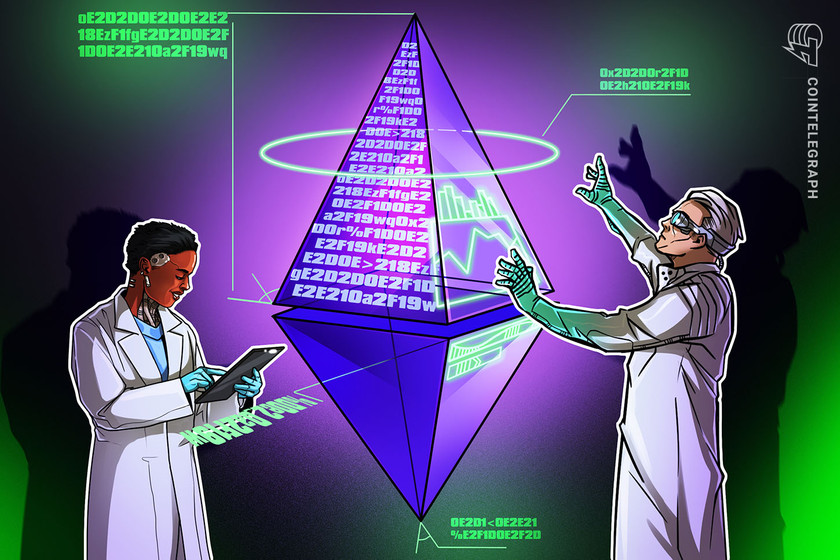
The first day of the main stage event included a keynote presentation from Ethereum's Vitalik Buterin, 1inch Network's Sergej Kunz, and Klaytn Foundation's Sam Seo.
The fifth annual Korea Blockchain Week kicked off on Aug. 8, with more than 7,000 people attending Asia's largest blockchain event of 2022.
The Seoul-based event is set to run its main-stage sessions on Aug. 8 and 9, while side events such as music festivals and nonfungible token (NFT) art galleries will go through until Friday, Aug. 12.
This year Korea Blockchain Week features presentations from more than 120 figures in the blockchain space, including prominent names such as Ethereum co-founder Vitalik Buterin, Binance CEO Changpeng Zhao, Animoca Brands chair Yat Siu and Polygon co-founder Sandeep Nailwal.
The event is hosted by FactBlock and Hashed (co-host) and is sponsored by Solana, Klaytn, and Wemade. Key focus topics will include decentralized finance, NFTs, gaming, the Metaverse, Web3 technology and crypto.
If you missed the action, here’s a literary highlight reel of all the most important moments from the first day of the event, brought to you by the Cointelegraph team currently on the ground in Seoul.
Vitalik: Layer-2 scaling will make crypto payments 'make sense' again
Ethereum (ETH) co-founder Vitalik Buterin has argued that crypto payments will once again “make sense” as transaction costs will soon fall to fractions of a cent due to layer-2 rollups.
He pointed to “solid work happening” with roll-ups at the moment, such as Optimism’s layer-2 scaling solution for Ethereum, which has worked to get the size and cost of data in blockchain transactions down by introducing zero byte compression.
Related: 60 million NFTs could be minted in a single transaction: StarkWare founder
“So today with roll-ups, transaction fees are generally somewhere between $0.25, sometimes $0.10, and in the future with roll-ups with all of the improvements to efficiency that I talked about. The transaction costs could go down to $0.05, or even maybe as low as $0.02. So much cheaper, much more affordable, and a complete game changer.”

Web2 adoption key to Metaverse success, says Klaytn Foundation direct
Sam Seo, the director of the metaverse and blockchain ecosystem Klaytn Foundation, thinks that the widespread adoption of the Metaverse will be “easier” if Web2 companies integrate the tech with their products and services.
Related: Major crypto exchange announces its arrival in the metaverse
Speaking with Cointelegraph during the Korea Blockchain Week (KBW), Seo suggested that Web3 Metaverse projects generally have issues attracting a mainstream audience, as people often have a hesitancy to use new technology from companies that they have never heard of.
“If new ideas are combined with Web2 platforms like [local social media app] Kakao, especially in South Korea, I mean, there's accessibility to these new ideas for new services that couldn't be easier than just starting from scratch.”

DeFi market has room for growth in Korea: 1inch co-founder
Decentralized finance (DeFi) aggregator 1inch Network has revealed plans to expand within the Asian market, according to its co-founder Sergej Kunz.
Speaking to Cointelegraph, Kunz said that despite the DeFi market being relatively small in Korea and Asia, there are a number of Asia-based Web3 companies that 1inch is looking to partner with.
Related: Wirex partners with 1inch to enable wallet-based token swaps
However, Kunz also added that the biggest barrier to entry appears to be a lack of understanding about DeFi and how to use crypto wallets:
“As soon as people understand that they can [yield] farm, they can swap, they can exchange and get easy access to cryptocurrencies on Ethereum with a few simple EVM-compatible networks, the market will grow a lot.”
Crypto.com hits key regulatory milestone in South Korea
Crypto exchange Crypto.com has announced a key regulatory milestone in South Korea after acquiring two local companies, giving it access to crypto and payments registration in the country.
The announcement came during Korea Blockchain Week 2022 after the company acquired payment service provider 'PnLink Co. Ltd.' and virtual asset service provider 'OK-BIT Co. Ltd.'
Related: Crypto.com scores regulatory approval from Cyprus SEC
The move means they have now secured Electronic Financial Transaction Act and Virtual Asset Service Provider Registration in South Korea. However, the company did not disclose whether this means it can offer its full-suite of crypto trading services in the country.

